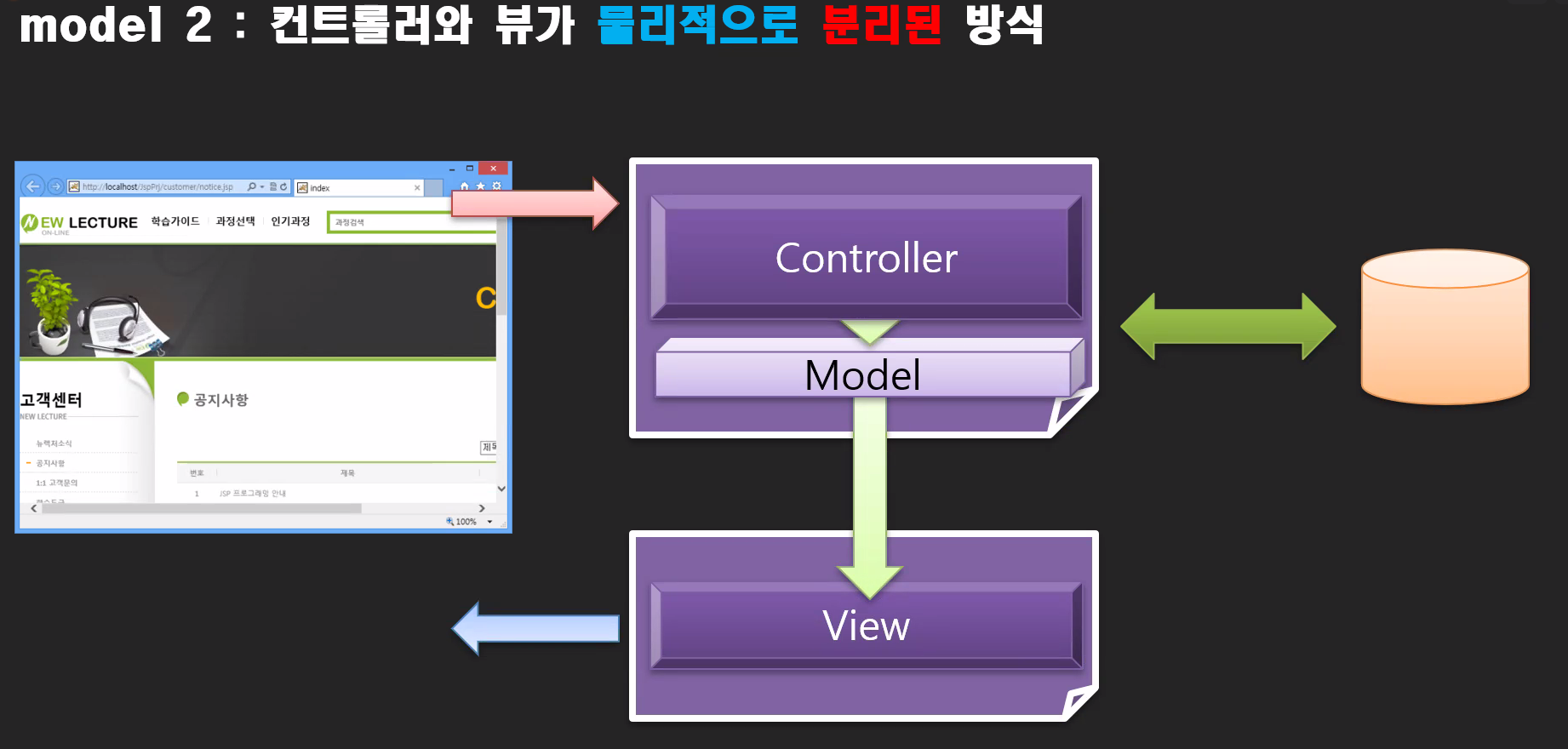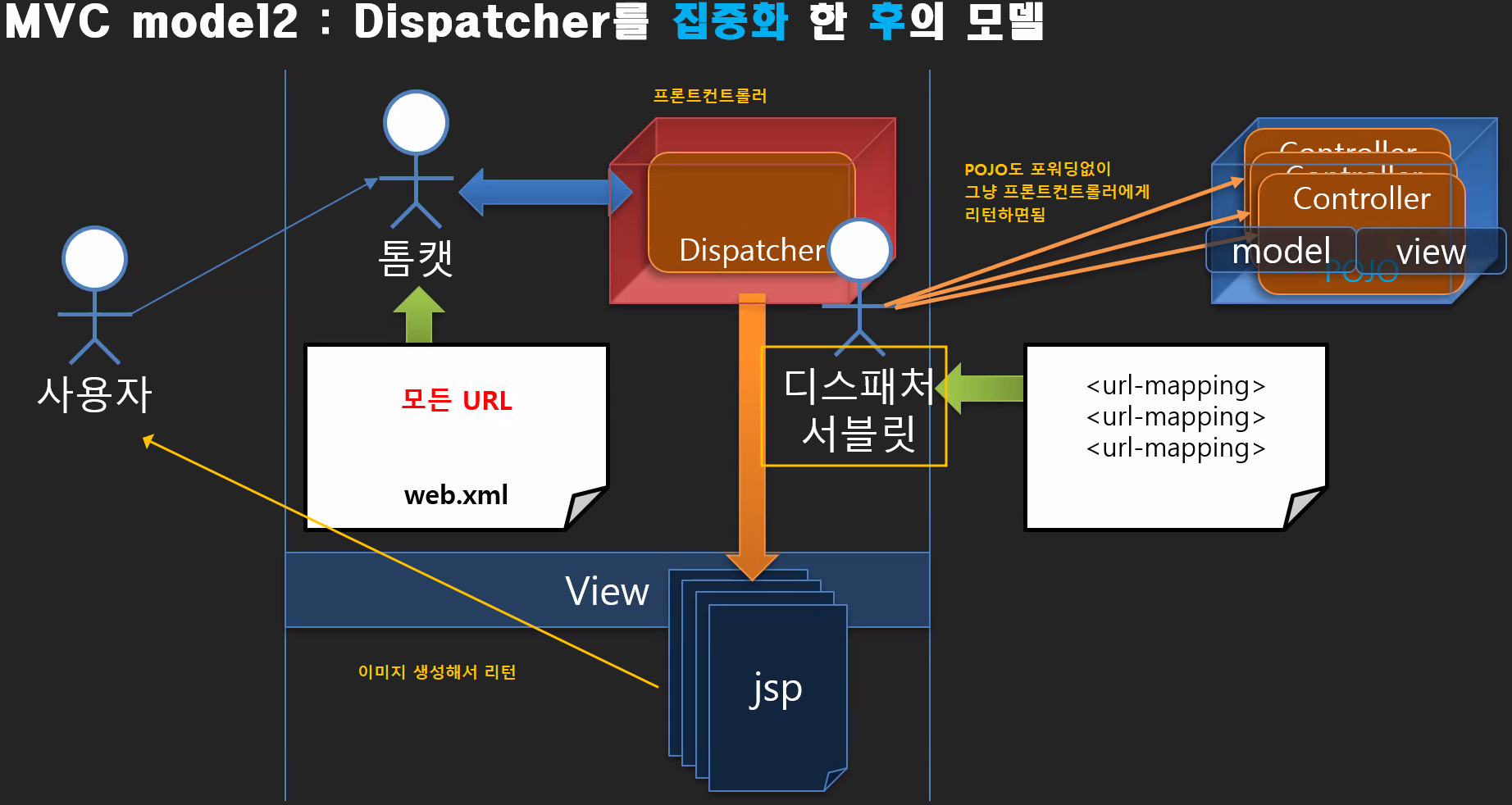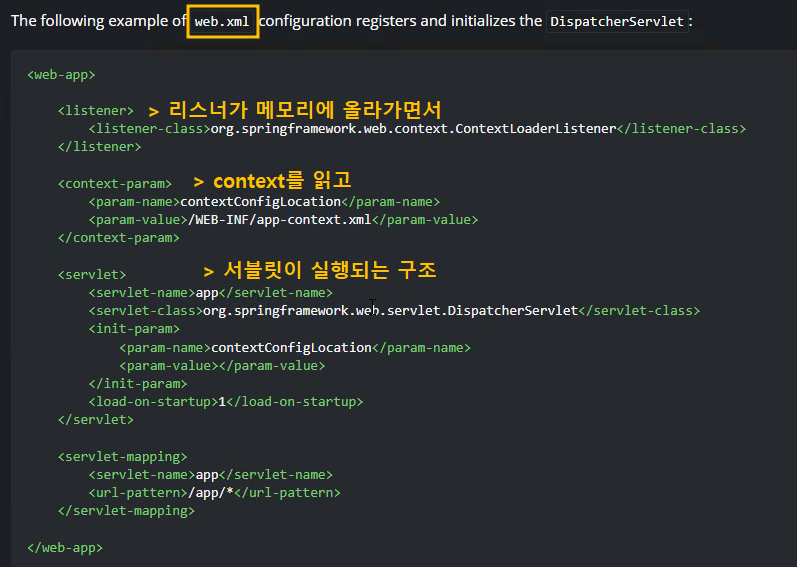✅ Controller의 분리와 POJO 컨트롤러 (*POJO class)
기존의 컨트롤러: 사용자 입출력을 처리함 (출력은 jsp에게 전달하긴함!)
이런 서블릿 컨트롤러가 많아지고, 각각 입력받는 방법이 다르고 forwarding하는 방법이 반복적임.

👉 프론트 컨트롤러의 형태가 비슷해서 라이브러리가 제공됨 == 스프링mvc




디스패처 서블릿 (프론트컨트롤러)를 쓰는 이유
- 파라미터 쉽게 사용
- 포워딩이 쉬워짐
컨트롤러를 어떤 라이브러리를 쓰냐에 따라서 난이도가 쉬워짐.
(* 프론트컨트롤러가 일을 많이할수록 POJO의 일은 줄어드므로 프론트 컨트롤러의 역할이 중요하다)
어노테이션 설정과 어노테이션 속성을 어떻게 인식하지? ▶ 스프링을사용하며 살펴봐야 할 부분
✅ 스프링 MVC
https://docs.spring.io/spring-framework/reference/web/webmvc/mvc-servlet.html
DispatcherServlet :: Spring Framework
Spring MVC, as many other web frameworks, is designed around the front controller pattern where a central Servlet, the DispatcherServlet, provides a shared algorithm for request processing, while actual work is performed by configurable delegate components
docs.spring.io

<web-app xmlns="https://jakarta.ee/xml/ns/jakartaee"
xmlns:xsi="http://www.w3.org/2001/XMLSchema-instance"
xsi:schemaLocation="https://jakarta.ee/xml/ns/jakartaee
https://jakarta.ee/xml/ns/jakartaee/web-app_6_0.xsd"
version="6.0"
metadata-complete="true">
<display-name>Welcome to Tomcat</display-name>
<description>
Welcome to Tomcat
</description>
<servlet>
<servlet-name>app</servlet-name>
<servlet-class>org.springframework.web.servlet.DispatcherServlet</servlet-class>
<load-on-startup>1</load-on-startup>
</servlet>
<!-- 모든 URL을 처리하도록 맵핑한다 -->
<servlet-mapping>
<servlet-name>app</servlet-name>
<url-pattern>/*</url-pattern>
</servlet-mapping>
</web-app>
#️⃣ web.xml설정
Container Overview :: Spring Framework
As the preceding diagram shows, the Spring IoC container consumes a form of configuration metadata. This configuration metadata represents how you, as an application developer, tell the Spring container to instantiate, configure, and assemble the objects i
docs.spring.io
👉 이렇게 실행시키면 아직 예외가 뜬다 (500번 에러)

👉 근본원인에 보면 [/WEB-INF/app-servlet.xml]이 없다고 나온다.
즉 dispatcher servlet이 찾아갈 pojo servlet에 대한 mapping자료인 app-servlet.xml이 없다는 것. 경로를 만들어주자!


#️⃣ POJO Controller 만들기
(*아직 예전방식의 컨트롤러 코드 - 서블릿에서 완전히 벗어나진 못했음)
//@WebServlet("/menu/list") -- app-servlet.xml로부터 연결되므로 url맵핑이 필요가없어진다
//서블릿은 없어지고 부모가 스프링으로 바뀐다
public class ListController implements Controller {
@Override
public ModelAndView handleRequest(HttpServletRequest request, HttpServletResponse response) throws Exception {
ServletContext application =request.getServletContext();
SqlSessionFactory sqlSessionFactory = (SqlSessionFactory) application.getAttribute("sqlSessionFactory");
SqlSession sqlSession = sqlSessionFactory.openSession();
MenuRepository repository = sqlSession.getMapper(MenuRepository.class);
List<Menu> list = repository.findAll();
//request.setAttribute("list", list); -- 기존포워딩방법
mv.setViewName("/WEB-INF/view/menu/list.jsp");
mv.addObject("list", list);
//forwarding
return mv;
}
// @Override
// protected void service(HttpServletRequest req, HttpServletResponse resp) throws ServletException, IOException {
//
// ServletContext application =req.getServletContext();
//
// SqlSessionFactory sqlSessionFactory = (SqlSessionFactory) application.getAttribute("sqlSessionFactory");
// SqlSession sqlSession = sqlSessionFactory.openSession();
// MenuRepository repository = sqlSession.getMapper(MenuRepository.class);
// List<Menu> list = repository.findAll();
//
// req.setAttribute("list", list); //값을 받았으니 jsp로 포워딩해줘야함
//
// //dispatcher로 연결해주기 (절대경로로 설정)
// req.getRequestDispatcher("/WEB-INF/view/menu/list.jsp").forward(req, resp);
// }
}
https://docs.spring.io/spring-framework/reference/web/webmvc/mvc-config/enable.html
Enable MVC Configuration :: Spring Framework
In Java configuration, you can use the @EnableWebMvc annotation to enable MVC configuration, as the following example shows: In XML configuration, you can use the element to enable MVC configuration, as the following example shows: The preceding example re
docs.spring.io
'😵 ~23.11.10' 카테고리의 다른 글
| 0914 | 스프링 config.xml과 annotation 설정법 / 경로별로 클래스 나누고 annotation 설정하기 (0) | 2023.09.15 |
|---|---|
| 0913 | DI, 스프링기능(IoC개념), XML과 Annotation을 활용한 지시서찾기 (0) | 2023.09.13 |
| 0911 | MVC 모델 개념 / JSP action tag / JSTL / MVC모델2 (1) | 2023.09.11 |
| 0908 | JSP 내장객체 / 데이터 받아와서 웹에 띄우기 / EL표현식 (0) | 2023.09.11 |
| 0907 | 서블릿 생명주기와 startUp 옵션 / @WebServlet과 @WebListener / servlet context (2) | 2023.09.07 |